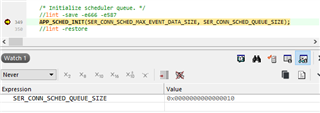2020-01-24-092119EST-ProductStoppedGettingEventsFromNordicDK.txtImprivataTestNordicEventsNotReceived.zipCalls_to_pc_ble_driver.cpp0285.2020-02-24-TestProgramUploadedToNordicSupport.zipFeb25TestProgramUploadedToNordicSupport.zipImprivata_bgTestApp.zipbgSDKTestAppMay4.zip2020-05-05-035347-NordicDK_USB840M_200505_ClockInternal_2in1.hex.txt.txtbgSDKTestAppMay6.zipI’m developing an application based on pc-ble-driver to talk to an nRF52840-based dongle (from Fanstel).
I’m having trouble disconnecting cleanly when a connection has operations in progress. For example, I call ‘sd_ble_gattc_write’, which returns NRF_SUCCESS, but I don’t receive event BLE_GATTC_EVT_WRITE_RSP (after waiting 60 seconds), so I decide to disconnect. When this happens, sd_ble_gap_disconnect returns NRF_SUCCESS, but I do not receive BLE_GAP_EVT_DISCONNECTED even after waiting 30 seconds. The connection supervision timeout is 4 seconds. What could cause the disconnect to not generate any BLE_GAP_EVT_DISCONNECTED event?
What I’m trying to accomplish here: if a connection is not responsive, I want to end that connection, without disturbing other connections I have open.
Thanks,
Paul Bradford



